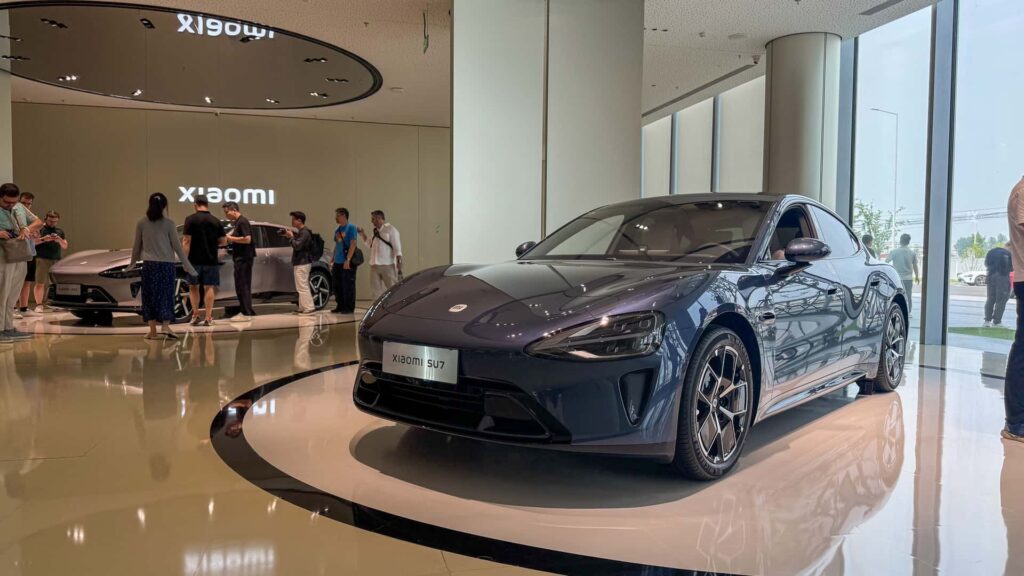
China has emerged as a formidable force in the global electric vehicle (EV) market, drawing attention from industry leaders worldwide. Ford CEO Jim Farley recently described his visits to China as “the most humbling thing” he has ever experienced, highlighting the country’s technological advancements and competitive edge in the EV sector. Farley shared his insights during an interview at the Aspen Ideas Summit, underscoring the impressive strides made by Chinese automakers.
During his conversation with journalist Walter Isaacson, Farley revealed that he has visited China multiple times over the past year to assess the competition. He noted that one of his key observations was the superior in-vehicle technology offered by Chinese manufacturers. “They have far superior in-vehicle technology,” Farley remarked, emphasizing the gap between Chinese and Western automakers.
China’s Technological Leap in the Auto Industry
The auto industry has long aspired to create “smartphones on wheels,” a concept that a few companies, such as Tesla, have successfully realized. However, most automakers are still striving to catch up. According to Farley, Chinese firms have elevated the in-vehicle digital experience significantly, a sentiment echoed by industry observers familiar with the market.
In contrast to the U.S., where automotive technology often consists of basic media players and navigation systems, Chinese vehicles offer a more integrated digital experience. “Huawei and Xiaomi are in every car,” Farley explained. “You get in, you don’t have to pair your phone. Automatically, your whole digital life is mirrored in the car. You have an AI companion that you can talk to … All the automatic payment is already there. You can buy movie tickets. It has facial recognition so it knows who’s in which seat and which media you like.”
Competitive Challenges and Cost Advantages
The challenge for Ford and other non-Chinese automakers extends beyond technological features. Chinese companies benefit from substantial government subsidies and vertical integration, allowing them to achieve significant manufacturing scale and reduce costs. Despite the lower price tags, the quality of Chinese vehicles remains high, posing a formidable challenge to global competitors.
“And even beyond that, their cost, their quality of their vehicles is far superior to what I see in the West,” Farley continued. “We are in a global competition with China, and it’s not just EVs. And if we lose this we do not have a future at Ford.”
BYD, China’s largest EV manufacturer, exemplifies this trend with its Seagull hatchback, priced under $10,000 domestically and around $26,000 in Europe. Meanwhile, many global automakers are still grappling with scaling up EV production and managing high battery costs. Analysts caution that the intense price competition in China’s car industry may lead to market consolidation as smaller players struggle to survive.
Ford’s Strategic Response
In response to these challenges, Ford is actively learning from China’s successes. Farley has taken his leadership team to China to test drive the latest vehicles, bringing back insights to the company’s headquarters in Detroit. “Then we pick the four or five that we love and then we put them on a plane and fly them to Detroit. And then we drive the crap out of them, and then we take them apart and we put them back together,” Farley explained.
Ford is also developing a $30,000 electric vehicle, which Farley describes as “the Model T of EVs.” The company is investing in the production of more affordable lithium iron phosphate (LFP) batteries in Michigan through a partnership with China’s CATL, despite political controversies surrounding the collaboration. Farley argues that this cooperation is essential for building cost-effective EVs in the United States.
“People don’t realize that China has IP that America needs,” he said. “I think we just need to be more humble as a country that they do things really well, that we need to learn.”
As Chinese automakers continue to expand globally, high tariffs have so far limited their presence in the U.S. market. However, industry experts anticipate that Chinese vehicles will eventually make their way to American shores, further intensifying competition.
Ford currently offers two electric models in the U.S.: the Mustang Mach-E crossover and the F-150 Lightning pickup. As the company navigates the evolving automotive landscape, it remains focused on leveraging insights from China to enhance its competitiveness in the global EV market.





